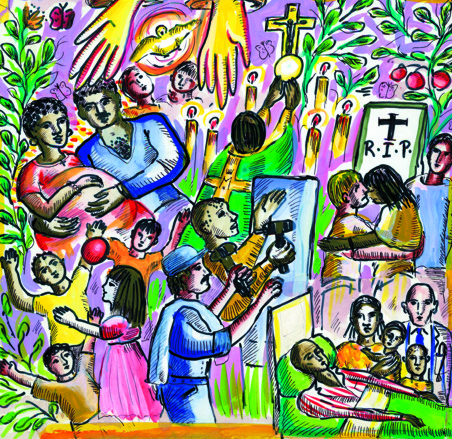
When we think of the term spirituality, at least in a Christian sense, it is often to do with religion, prayer, retreats or some activity that includes God and faith, something deliberate or conscious. However another meaning of spirituality is “living in the presence of God” as opposed to theology which is “thinking or speaking about God.” God is central to spirituality, but one may not even be very conscious of God’s presence. Pope Francis’s vision would be “everything is connected, God is present everywhere and in all things that God has created.” God is the life-force in all that exists. Many of his writings including the encyclical LAUDATO SI have much to say about spirituality of creation, of work, freedom, land and more.
But apply spirituality to the concept of family. Firstly God as Trinity is a Family, Father, Son and Spirit, a perfect community of love. The human family, as a community of love is a mirror of the Trinity. That is theological, as is the statement “the family is the domestic church,” a vision for families re-captured from the very early years of the Church.
Secondly creation and co-creation with God concern family relationships and sexuality as the method for ongoing reproduction in human, animal and plant life.
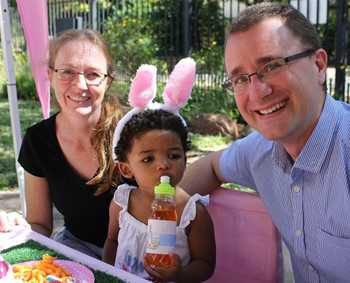
Thirdly, Church as Family was chosen by the African Synod of 1994 as a model for what the big Church should be. So we can look at Church as Family and Family as Church.
Fourthly. For us humans when it comes to ordinary daily life and living out of that image, more practical relationships, qualities and characteristics can be looked for and applied.
1. Unconditional Acceptance. In a family we learn to live with and accept each other even though there are times when we don’t even like each other. As the saying goes, “You can choose your friends, but you cannot choose your family.” How accepting are we of others in the Church as if they were “family?”
The following list of qualities of the family as the domestic church borrowed from an article by Fr Chuck Gallagher, and a model for the wider Church is a good example of family spirituality and is also built around the definition of a family as “an intimate community of life and love, bonded together for life by blood, marriage or adoption. (JPII 1981 Familiaris consortio.) Each point can be considered from the two perspectives, Church as Family and Family as Church.
2. Warmth and Love. These qualities are experienced ideally in the intimacy of family life, in the passion of the husband-wife relationship, the tenderness of parents and the camaraderie or the competitiveness and bickering of siblings. Flesh and blood sacraments remind us that in the old Testament the relationship between God and his people is symbolized by the relationship of husband and wife. How warm and loving are we in our parish? How faithful?
3. Family goals must be greater than individual goals. Human rights are family rights too. Children’s and women’s rights should be negotiated in the context of family rights. Similarly the common good of the whole Church is more important than the wants and needs of individual families.
4. The need for belonging. Every human being has basic needs to be loved, to belong, to be needed, to be of worth. Is there a more suitable place to have those needs met than within the boundaries, not confines, of a family? Other needs and qualities we learn in the home are trust and faithfulness. If a child cannot trust those adults in his or her own home, or does not experience faithfulness of parents through difficult times how can they develop those qualities in themselves? Similarly all these human needs are experienced in the wider Church.
5. Family meals are the “liturgy” of the home and, celebrated as valued family time act as an introduction to the deeper real meaning of the Eucharist. Micro-waved TV dinners or take-aways eaten on the trot are not prayerful and conducive to fellowship and hardly feed our spirits.
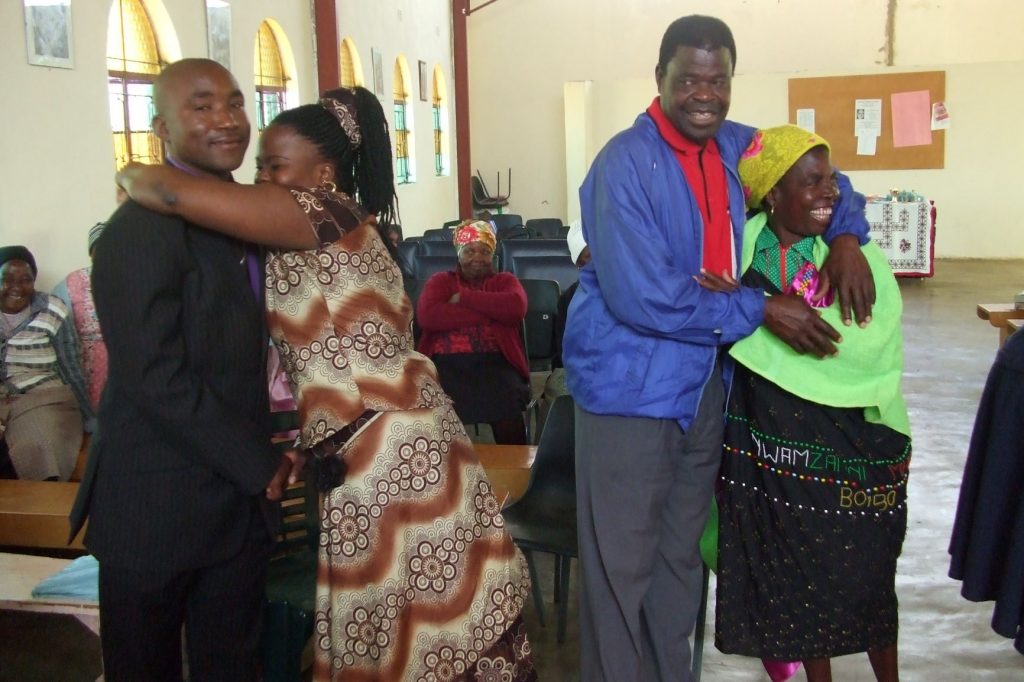
6. Conflict, forgiveness and healing are another “sacramental” aspect of family life which is the school for many life skills that include conflict resolution. We learn how to fight and make up, we learn about forgiveness by the way our parents forgive us and each other, how we in the family are encouraged to restore relationships also with older brothers, sisters and relatives. This is our way towards understanding the Sacrament of Reconciliation.
7. THE ISSUE is not the issue, WE are the issue. In a family we argue over all sorts of things, like food, time, homework, going out or experience anger and real violence. But the real issue is how important we, as people, are to each other, how we treat each other or neglect and hurt the special ones we have pledged to love and cherish. In our wider social and church life are we sufficiently aware that the real issue is the people in the parish, in our workplace, school, not what they are doing.
8. Without communication our relationships decay. It is often not easy to communicate in a family taking into consideration the generation gap and different moods and needs of all. Similarly in the parish there are certain differences and many reasons and excuses for not being open and honest with one another. Synodality is giving us a challenge there.
9. Security of permanence. In a family we not only feel we belong, we also need to have the security of knowing that even if we break the rules we are still part of the family. We don’t “excommunicate” our children when they live together, take drugs, leave the Church. It hurts but they are still our family. Parishes could learn greater compassion recognizing the bonds that connect us to those affected who are different, divorced, remarried, LGBT+
10. Our interdependence rather than independence in a family models the ideal for the big Church. Successes or failures of one affect us all. We rejoice over school results, job promotions and grieve over a loss of job or friend, a fight, a breakdown in relationships and illness.
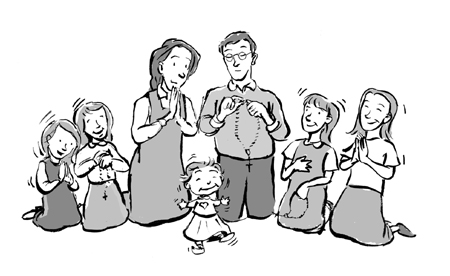
Each of these qualities illustrates an aspect of family spirituality and how it models a true spirituality of community. Individuals, couples, families and communities can rate themselves on these points, reflect, discuss and pray alone or together, praising God with joy and thanksgiving for the gift of family, asking for guidance and seeking forgiveness for the times we have been less than God has intended us to be.
Of course when thinking of OUR WORLD A FAMILY OF FAMILIES and all of creation, animal and plant families not all these qualities but certainly some of them are relevant too. As the adapted saying goes, THE FAMILY THAT PRAYS AND PLAYS TOGETHER STAYS TOGETHER.
The human person grows more, matures more and is sanctified more to the extent that he or she enters into relationships, going out from themselves to live in comm union with God, with others and with all creatures. In that way they make their own that trinitarian dynamism which God imprinted in them when they were created. Everything is interconnected, and this invites us to develop a spirituality of that global solidarity which flows from the mystery of the Trinity. LS 240

TR Family weekly e-newsletter 26 April 2023





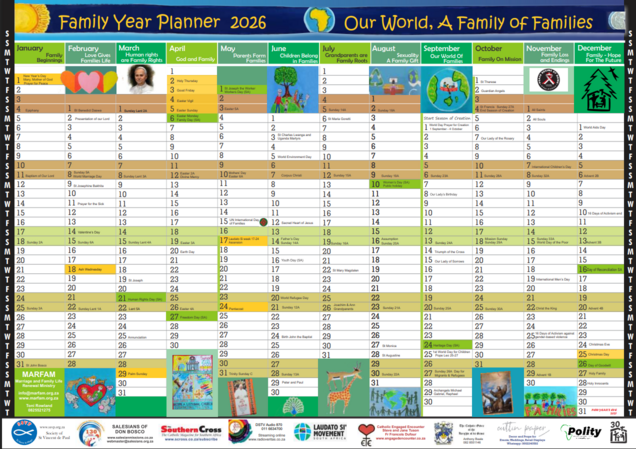
Recent Comments